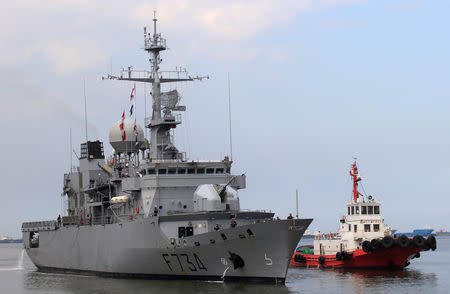Exclusive: In rare move, French warship passes through Taiwan Strait

By Idrees Ali and Phil Stewart WASHINGTON (Reuters) - A French warship passed through the strategic Taiwan Strait this month, U.S. officials told Reuters, a rare voyage by a vessel of a European country that is likely to be welcomed by Washington but increase tension with Beijing. The passage, which was confirmed by China, is a sign that U.S. allies are increasingly asserting freedom of navigation in international waterways near China. It could open the door for other allies, such as Japan and Australia, to consider similar operations. The French operation comes amid increasing tensions between the United States and China. Taiwan is one of a growing number of flashpoints in the U.S.-China relationship, which also include a trade war, U.S. sanctions and China's increasingly muscular military posture in the South China Sea, where the United States also conducts freedom of navigation patrols. Two officials, speaking on condition of anonymity, said a French military vessel carried out the transit in the narrow waterway between China and Taiwan on April 6. One of the officials identified the warship as the French frigate Vendemiaire and said it was shadowed by the Chinese military. The official was not aware of any previous French military passage through the Taiwan Strait. The officials said that as a result of the passage, China notified France it was no longer invited to a naval parade to mark the 70 years since the founding of China's Navy. Warships from India, Australia and several other nations participated. China said on Thursday it had lodged "stern representations" with France for what it called an "illegal" passage. "China’s military sent navy ships in accordance with the law and the rules to identify the French ship and warn it to leave," defense ministry spokesman Ren Guoqiang told a regularly scheduled media briefing, while declining to say if the sailing had led to the withdrawal of France's invitation to the parade of ships this week. "China’s military will stay alert to firmly safeguard China's sovereignty and security," he said. Colonel Patrik Steiger, the spokesman for France's military chief of staff, declined to comment on an operational mission. The U.S. officials did not speculate on the purpose of the passage or whether it was designed to assert freedom of navigation. MOUNTING TENSIONS The French strait passage comes against the backdrop of increasingly regular passages by U.S. warships through the strategic waterway. Last month, the United States sent Navy and Coast Guard ships through the Taiwan Strait. The passages upset China, which claims self-ruled Taiwan as part of its territory. Beijing has been ramping up pressure to assert its sovereignty over the island. Chen Chung-chi, spokesman for Taiwan's defense ministry, told Reuters by phone the strait is part of busy international waters and it is "a necessity" for vessels from all countries to transit through it. He said Taiwan's defense ministry will continue to monitor movement of foreign vessels in the region. "This is an important development both because of the transit itself but also because it reflects a more geopolitical approach by France towards China and the broader Asia-Pacific," said Abraham Denmark, a former U.S. deputy assistant secretary of defense for East Asia. The transit is a sign that countries like France are not only looking at China through the lens of trade but from a military standpoint as well, Denmark said. Last month, France and China signed deals worth billions of euros during a visit to Paris by Chinese President Xi Jinping. French President Emmanuel Macron wants to forge a united European front to confront Chinese advances in trade and technology. "It is important to have other countries operating in Asia to demonstrate that this is just not a matter of competition between Washington and Beijing, that what China has been doing represents a broader challenge to a liberal international order," Denmark, who is with the Woodrow Wilson Center think-tank in Washington, added. Washington has no formal ties with Taiwan but is bound by law to help provide the island with the means to defend itself and is its main source of arms. (Reporting by Idrees Ali and Phil Stewart in Washington; Additional reporting by Sophie Louet in Paris, Yimou Lee in Taipei and Ben Blanchard in Beijing; Editing by James Dalgleish, Robert Birsel)
